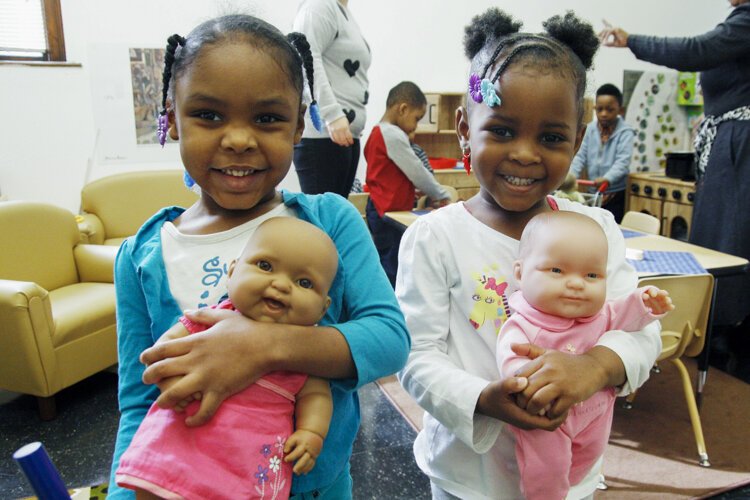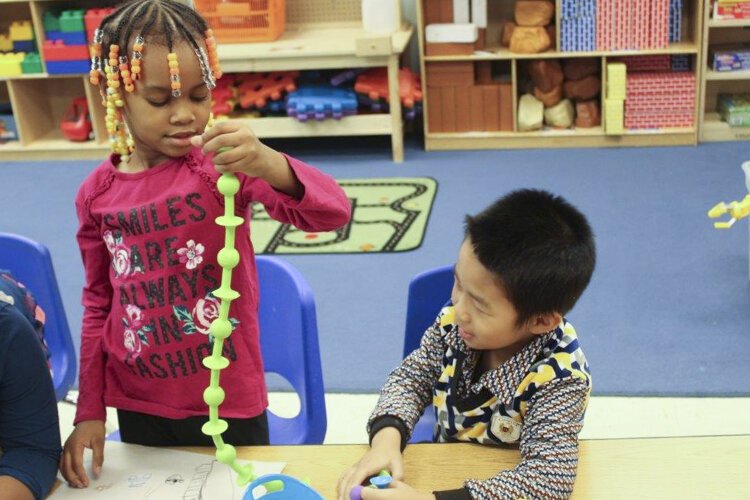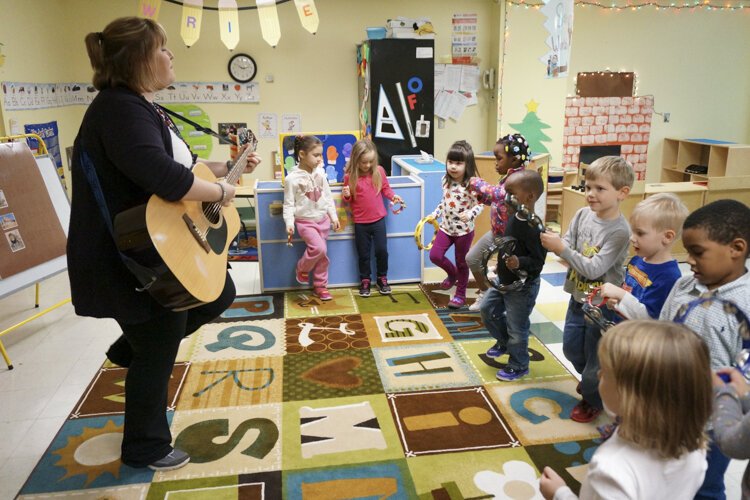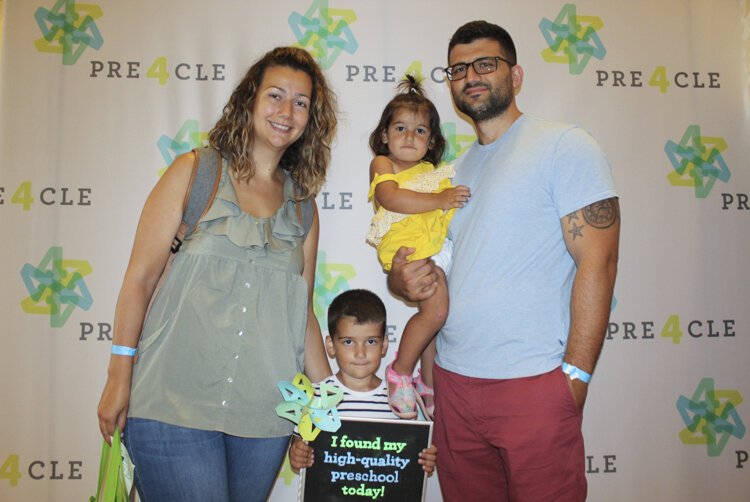PRE4CLE is building back stronger for children, families, and the economy
Last March, Fumiko had just started her new position with Cuyahoga Job and Family Services. Her two-year-old was thriving at Catholic Charities’ at Rainbow Terrace Head Start.
“Then COVID-19 blew up in the news,” Famiko recalls.
State mandates forced everything to close, so the young mother did what all families had to do. She learned a new balancing act—working from home, supervising her two school age children’s learning time, and caring for her rambunctious two-year-old.
As executive director of PRE4CLE, a program that ensures affordable access to high-quality preschools under the Cleveland Plan, Katie Kelly understands Fumiko’s struggles. She says the pandemic has brought childcare and early child education to the brink of collapse, leading to staff layoffs, drops in enrollment, temporary, and permanent site closures.
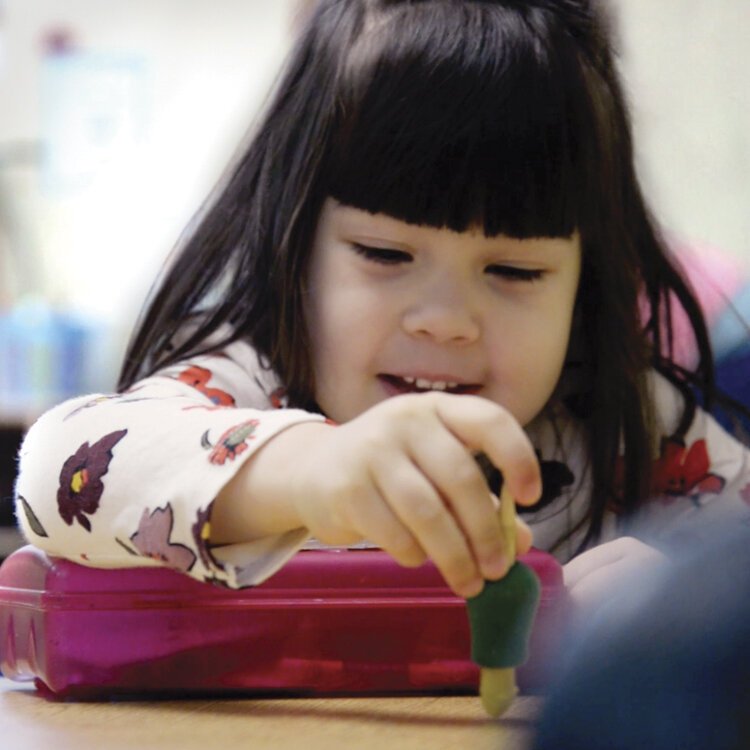 PRE4CLE maintains that childcare and early education are essential services provided for working families during this pandemic.Since summer, some preschool and childcare sites have re-opened, and Fumiko says she felt safe sending her son back to his program with all its safety protocols in place.
PRE4CLE maintains that childcare and early education are essential services provided for working families during this pandemic.Since summer, some preschool and childcare sites have re-opened, and Fumiko says she felt safe sending her son back to his program with all its safety protocols in place.
But Amber, a mother of a two-year-old and a five-year-old in Catholic Charities’ Parkview Head Start, says she was wary of sending her kids into school during the pandemic.
“Their programs are amazing,” she says. “The only problem is the virus. I’m not sure what safety means because the health news keeps changing.”
Studying the pandemic’s impact on Cleveland’s childcare and early education system, PRE4CLE has developed a report entitled Build Back Stronger.
In the report, PRE4CLE and other educators have developed recommendations for early learning centers to operate safely, stay open, and ensure Cleveland’s youngest students continue to get quality, affordable educations—even during the pandemic.
Prioritizing Health and Safety
When COVID-19 first hit Cleveland back in March, educators were not quite sure how to handle the developing safety concerns.
“Our initial crisis was to ensure the health and wellbeing of our students and staff,” recalls Margaret Van Dyne, YWCA of Greater Cleveland Early Learning Center administrator. “So little was known at the time. Initial plans and processes were built off what we did know.”
Like everywhere else, the early care and education industry had limited access to Personal Protective Equipment (PPE), cleaning supplies, and other necessities for keeping young children safe.
“Elijah puts everything into his mouth,” says Fumiko. “He loves to hug and would rather turn a face mask into a helicopter,” While young children are not required to wear face masks in care settings, all teachers and staff must mask up.
“We reopened in June and limited group sizes to nine children,” says Van Dyne. “We have rearranged the classroom to provide more space for children [and easier access] for staff cleaning and disinfection.”
Supporting Children and Families
When preschool and daycare sites closed, centers could still care for the children of essential workers though special licensing—or they could support their current families, who were now home bound.
To keep all childcare and early learning centers solvent, funding was made available through the CARES Act.
Officials with YWCA early learning centers reached out to their families to determine individual needs. According to Van Dyne, they began weekly deliveries of food, financial support for housing stability, and learning materials and activities. Families were called daily by teachers with lesson plans, according to Van Dyne.
“We are providing extra support for kindergarten readiness,” Van Dyne explains. PRE4CLE is pushing Ohio officials to extend the window for schools to complete the Kindergarten Readiness Assessment for 2021.
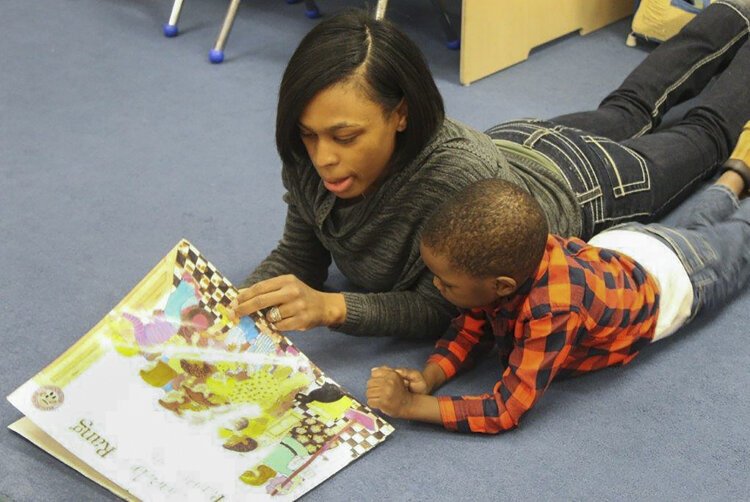 A preschool classroom at Denison Elementary School, a part of the Cleveland Metropolitan School District.During the shutdown, Rainbow Terrace arranged pick up stations and deliveries for breakfast, lunch and snack foods, along with educational materials and craft supplies. Teachers stayed in contact with the students with weekly phone calls.
A preschool classroom at Denison Elementary School, a part of the Cleveland Metropolitan School District.During the shutdown, Rainbow Terrace arranged pick up stations and deliveries for breakfast, lunch and snack foods, along with educational materials and craft supplies. Teachers stayed in contact with the students with weekly phone calls.
As a Head Start parent ambassador and Policy Board member, Marquis is an engaged father and his son just graduated from Catholic Charities’ St. Ignatius Head Start.
Marquis says he understands why many families are reluctant to return to a group setting. “With all the changing facts about COVID, fear has been the biggest barrier to returning,” he says.
According to Marquis, many families are accessing the virtual family curriculum, Ready Rosie, to prevent learning loss. When work pressures build, Marquis leans on his Head Start family group—formed before the pandemic to share childcare and learning activities among Head Start families.
It’s just one way educators are helping families and their students weather the pandemic.
“Working families need safe spaces for their children so they can maintain employment,” says Van Dyne. “If they are unable to access high quality early education, or options for childcare, families will struggle to maintain consistency. Saving early childhood programs will be vital to the return of the workforce.”
Kelly agrees. “Families can’t go back to work until they have safe, affordable, accessible childcare for their children,” she says.
Valuing the Childcare Workforce
An ongoing concern for Cleveland providers is their ability to properly staff programs. “Although much of our focus remains on children and families, providers are concerned about the viability of their programs,” says Van Dyne. She cites several reasons for the concern, which are supported by PRE4CLE’s report.
- Early childhood providers have been forced to lay off staff.
- Many are concerned about the mandates needed to reopen—lower teacher-student ratios, smaller group sizes, and increased costs for staffing and cleaning.
- Many early childhood programs have not reopened, choosing to shutter their doors due to significant financial stresses.
- Nine months into the pandemic, nearly 100 early learning centers have not yet reopened.
Kelly points out that the early childcare work force also includes many older caregivers, some of whom have pre-existing conditions that make them especially vulnerable to the virus.
“They don’t want to return due to increased risk,” Kelly says, adding that some childcare workers are now at home overseeing their own children’s remote learning education. “At an average pay of $10.57 an hour, early care workers are under-valued and under-paid.”
PRE4CLE campaigns for compensation that matches the risk levels educators confront, and for social emotional resources for all workers negatively impacted by the crisis.
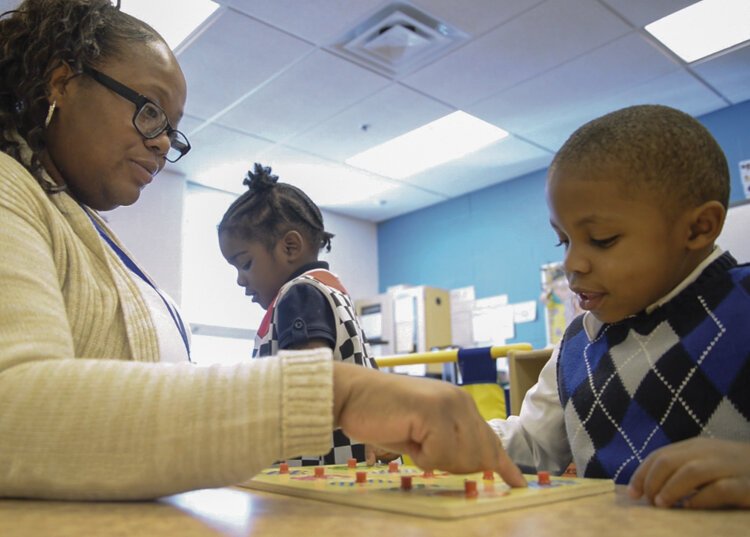 Providers are always on the frontlines of the pandemic because young children love to explore and connect.Early Childhood Care is Essential
Providers are always on the frontlines of the pandemic because young children love to explore and connect.Early Childhood Care is Essential
PRE4CLE maintains that childcare and early education are essential services provided for working families during this pandemic—now surging again.
“Working families need safe spaces for their children so they can maintain employment and build self-sufficiency outside of the home,” argues Van Dyne. “Without access to high quality early education, or options for childcare, families will keep struggling to maintain consistency. Saving early childhood programs will be vital to the return of the workforce.”
Kelly agrees. “Families can’t go back to work until they have safe, affordable, accessible childcare for their children,” she says, adding that PRE4CLE urges Ohio legislators, in the next federal relief bill, to push for $50 billion for childcare and relief payments to childcare programs to support operations nationwide.
“Our Build Back Stronger report calls for federal emergency funding, asks state leaders to hold the line on current funding, while dedicating additional funding for our recommendations,” says Kelly. “This crisis laid bare the weaknesses in our industry. We now have an opportunity to create a stronger early care and education system that supports kids, families and our economy.”
High Five
Despite the coronavirus pandemic, PRE4CLE released its annual report this week—"Reimagine Preschool"—describing the state of daycares and preschools and creative ways the partners are thinking ahead.


